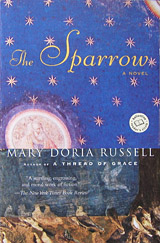|
| |
The Sparrow |
|
|
5 February 2006
The Sparrow
|
In the first chapter of this wonderful novel, the reader learns the whole story: After humans detect the radio signals of an alien civilization from a planet called Rakhat, the Jesuit Order (which, one must admit, has had more historical experience with First Contact than, say, the UN) sends a mission to the planet “for the greater glory of God.” Many years later, all but one of the crewmembers are dead and the sole survivor, Father Emilio Sandoz, returns to Earth physically mutilated and spiritually broken. Instead of spreading the Word to the aliens, it is Father Emilio who loses his faith. The Sparrow tells two stories in parallel. One recounts the mission—from the first meeting of the smart, likable misfits who find they are uniquely suited to the expedition, to the final, disastrous end. The other starts after Father Emilio’s return to Earth and deals with his struggle to reconcile his experiences with the idea of a just and benevolent God. Despite knowing how it’s going to end (or perhaps because of it) I was hooked by the story of the mission. Partly, I supposed, it was because as the mission progresses, the other storyline hints openly about the terrible events in store for them. Something horrible must have happened to cause Emilio to lose his faith, and (probably due to some primal, dark curiosity) I couldn’t wait to find out what it was. But it’s the ideas in the book that have stayed with me. In an interview, Mary Doria Russell talks about how she was brought up Catholic but at the age of fifteen left the Church and became an atheist. Twenty years later, after her son was born, she decided to convert to Judaism. In some ways The Sparrow is a conversation about the do’s and don’ts of a relationship with God. Father Emilio sacrifices everything (including a more earthly love) because he sees God’s design in his life. After the disaster of the mission—a mission that Emilio believed God led him to—it’s no wonder that his faith is shaken. In the novel, perhaps Russell is saying that you shouldn’t love God just because you think good things will happen to you if you do. God doesn’t work that way. That is the central idea of the book and possibly the most important idea in religion. People shouldn’t believe in something just because they will be rewarded—that kind of utilitarian calculus is the antithesis of spirituality. Instead, the only beliefs worth honoring on to are those that come with a material cost. The only thing that gives human life meaning—the only thing that makes us different from bacteria—is that we sometimes sacrifice our comfort, our wealth, and sometimes our lives, for some abstract belief. In Joss Whedon’s Serenity, another story about a bunch of misfits on a spaceship, Shepherd Book tells the agnostic Captain Reynolds that the only thing that’s going to get him through is “belief.” When Reynolds complains that “sermons make [him] sleepy,” Shepherd Book explains that he’s not talking about God. What he’s trying to say, I think, is that you don’t have to believe in God or a higher being or even some mystical energy field that controls your destiny—you just have to believe in something—otherwise, what’s the point? But it’s never easy, is it? In The Sparrow, as bad things start to happen to the characters, Anne, one of the agnostics in the group, angrily notices that when good things happen everyone thanks God, but when bad things happen no one blames Him.
|
